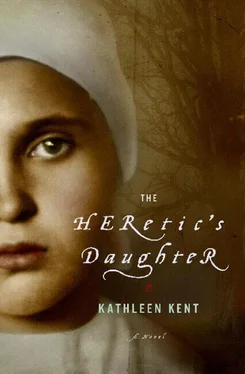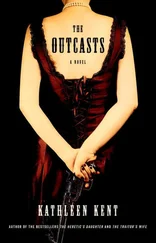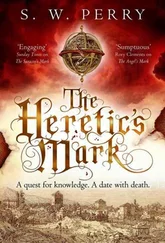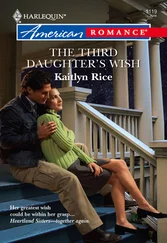I crawled back into bed and kept my back to her when Mercy shadowed her way in. I could feel her eyes on me and then felt a sharp weight as she dropped my shoe upon the bed. The ropes beneath us shifted as she settled her head on her arm, but I knew she would not easily fall into sleep. A strong, raw animal smell came from her body. I rolled the word around and around in my mind before parting my lips and whispering, “Whore.” The sound of it mingled with the rising storm and so I did not know whether or not she heard me say it. Margaret came to me in a dream that night. She stood on the far side of the Shawshin River and called out to me something I could not hear over the roaring of the wind. She cupped her hands around her mouth but still I could not hear her words. I ran back and forth on the embankment, looking for a way to get across, but there was no boat and no bridge. She pointed to a place beyond my shoulder, and the words floated to me. “Fire, Sarah. Fire.”
I woke to Tom shaking me frantically by the foot. He was shouting, “Fire, Sarah! The fields are on fire!”
Hannah opened her eyes then and, seeing the terror in Tom’s face, screamed like something dying. She clutched tightly to my legs, threatening to trip me as I struggled to pull a skirt over my head. I picked her up and ran with Tom to the edge of the fields. Mercy was running with Father towards a wall of smoke, and the world to the east of the barn was made of yellow, low-surging light. I could see Andrew running as fast as he could, bringing buckets of well water to Richard, who had climbed to the top of the barn to dampen the roof. There was a slight rise behind the barn and as I crested it I could see where the fire had started. A lone elm that had stood for generations had channeled the lightning as easily as a gutter channels rainwater. The split trunk lay blackened and dead and the fire was consuming the outer fields of hay on the far side of the path running along the crest from north to south. The wind buffeted first to the west and then to the east as the twin storms combined. I saw a man working next to Father, both desperately trying to make a space between the fields of hay and the tender shafts of wheat, their hoes rising and falling in rapid succession.
Mother grabbed at my shoulder and thrust me back in the direction of the barn, shouting, “Bring the scythes, Sarah, and there is another hoe just within the door. Hurry, for God’s sake, or we will be burned to the ground.”
I ran until my lungs ached, wondering what I was to do with Hannah. I could not bring her into the burning fields, and my brothers would be needed to keep the flames at bay. Her nails drew blood when I pulled her from my neck, and as I tied her to a post with a leather strap, she kicked and cried piteously. Her fear of being abandoned made her feral, and the whites of her eyes showed as she bit at the strap. I shouted to Andrew to remember to rescue Hannah if the barn should catch fire and prayed he would remember her in the confusion. I gathered up the needed tools and raced back to the fields, hoping I wouldn’t trip and cut off my legs, falling on the newly sharpened scythes. Mother and I worked next to the men as they dug their shallow trench, scything away the stalks to make a path the fire could not jump. But the fire raged on towards us and into the wheat, and I could feel the heat of it on my cheeks, curling my hair. I stopped for a moment to rest, but Mother pushed me and said hoarsely, “Don’t stop. Keep working.” I could hear Tom somewhere behind me as he lay down buckets of sand over the fallen shafts of grain.
The heat was terrible, but worse was the billowing smoke that found its way into every opening, until our eyes and ears and throats blistered and watered. I pulled my skirt up around my face to breathe, and suddenly I was standing alone in the tortured field, lost in a wall of smoke. I felt panic rising in my throat and turned to see a tongue of flame flowing like a runnel of silk towards the sole of my shoe. I cried out but could see nothing beyond the gray mass and would have run but did not know north from south, east from west. I sank to my knees and felt a creeping blankness in my head, like a drawstring tightening within a gray felt bag. There was a pain at my shoulders as fingers clamped around my arms. Strong hands lifted me up, and we ran through the fire clouds until I could see the sky and the fields again. Mercy clapped me harshly on the back as we coughed and spit foaming ash from our lungs. I looked up and saw the bruised knot my shoe had left on her brow, large enough to show through the blackened soot covering her face.
She said to me, without malice, “It seems we may both be homeless soon.”
My family and some of our close neighbors gathered on the crest, expecting to watch the burning of the remainder of the wheat. Robert Russell stood next to Father, as well as Samuel Holt and his brother Henry Holt from the farms near Ladle Meadow. A growing light came from the eastern horizon and the wind changed course and blew suddenly from the west, rushing to meet the dawn. The fire stalled for a moment, the heads of the flames licking at the air like tracking hounds. And then the fire turned and flowed east, churning and fast, as though it would throw itself into the sea. The Holts raced back to their farms, and with them ran my Father, his long hoe braced over one shoulder, its heated metal head sending up wisps of steam. A cold splinter of thought shifted in my head as I remembered Allen’s threat to burn us out. But our fields and house remained. It would be many more hours of work with a bucket and hoe before I could fall into bed, my skin and hair bathed and perfumed in acrid smoke. When I finally remembered Hannah, left tethered in the barn, it was in the full light of morning. She had fallen asleep, her first and last fingers pressed wetly into her mouth, but woke as soon as I lifted her to take her to the house. She would demand to be carried for days afterwards, eating and sleeping only in the circling embrace of my arms.
THE FIRE HAD burned the hay but left the wheat. The flames had come close to the corn, wilting some of the silk tassels and puckering the husks. The kernels from those ears at summer’s end would have a scorched taste, as if they had been dragged through the ashes in the hearth. The loss was disappointing but did not compare with the loss of some of our neighbors. The Holts suffered far worse, losing most of their yield. The fire stopped only when it came to the waters of the Skug River after sweeping across the whole of Ladle Meadow. When Robert Russell came to the house days after for the harvesting of the wheat, he said there were hardened feelings from the Holts, as our crops had been spared and theirs had not. I could see that Robert’s sandy brows had been burned quite off, and one cheek was oozing from raised, seeping blisters. His leather doublet was cracked and blackened from the heat, and I pitied him as he had no wife to bind his wounds or mend his vest. He had been widowed for many years and would have to marry again soon or be thought scandalous.
He turned to my mother and said with a smile, “Susannah Holt said she saw you dancing on the crest before the wind turned direction.” Robert could often play with her in such a way, and where the rest of us would have been singed for it, she would only dip her chin and smile. Sometimes the color in her cheeks would flare, if only for a moment. Had I been older, I might have sensed that she, though a married woman, was not above being seduced by a winning, handsome man. Rattling some pots at the hearth she said, “I cannot help that their fields were burned. I am sorry for it. They are decent enough folk. But Susannah is old and half blind, and if I was dancing about, it was to put out the fire from the hem of my skirt.” Later, when we had milled the wheat into flour at Parker’s Mill, we would send four bags of it to Susannah Holt, but the bread she made from it was not enough to soak up the bitter juices of resentment.
Читать дальше












